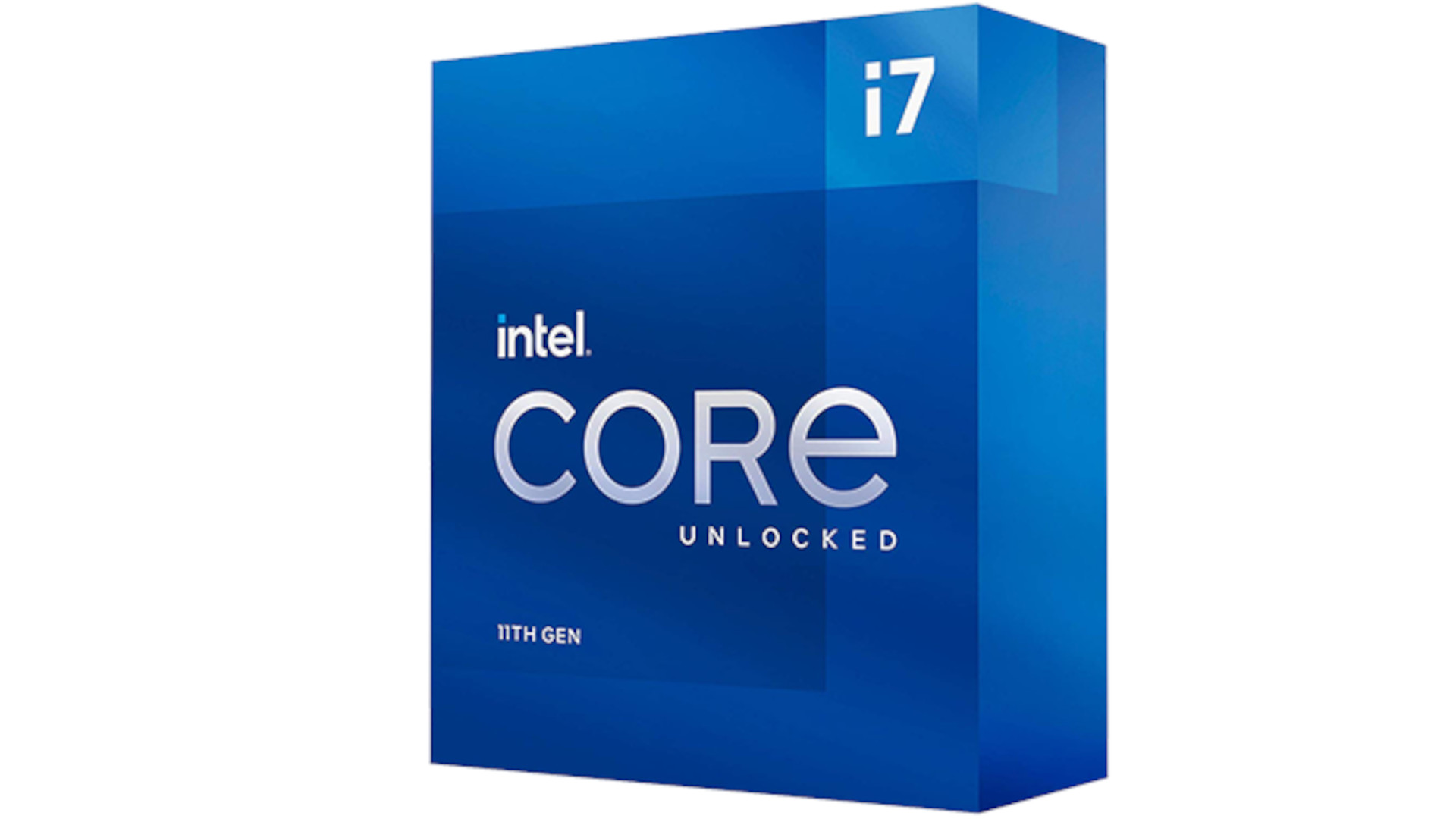The $399 Intel Core i7 11700K processor is part of Intel’s Rocket Lake product line and sits between two of AMD’s most popular Ryzen 5000 processors. The 11700K’s pricing should make it an appealing chip if you want the most performance from a mainstream Intel platform without paying the flagship price, but it faces stiff competition from AMD chips, which have dominated our list of Best CPUs (at least when they’re available for purchase).
Cypress Cove, Intel’s first new desktop PC chip architecture in six years, gives the Rocket Lake chips a 19% increase in IPC in most workloads. However, the backported Cypress Cove (designed for 10nm) comes with a significant tradeoff: Rocket Lake is still etched on the 14nm process and has a maximum of eight cores and sixteen threads. This is a step down from the previous-generation 10-core Comet Lake i9 models, and it pales in comparison to AMD’s monstrous 16-core Ryzen 9 5950X flagship.
The 19% IPC boost from Rocket Lake more than offsets the performance hit from the reduced core count, but it put Intel in a bind as it divided its product stack into Core i9 and Core i7 families — both series top out at eight cores.
The $399 Intel Core i7 11700K is a lower-end Core i9-11900K that has the same eight cores and sixteen threads as the $539 flagship. You can also save money by going with the graphics-less Core i7-11700KF (which is identical in every other way) and getting the chip for $374. This creates a $75 price difference between the 11700K and the Ryzen 7 5800X, which also lacks an integrated graphics engine.
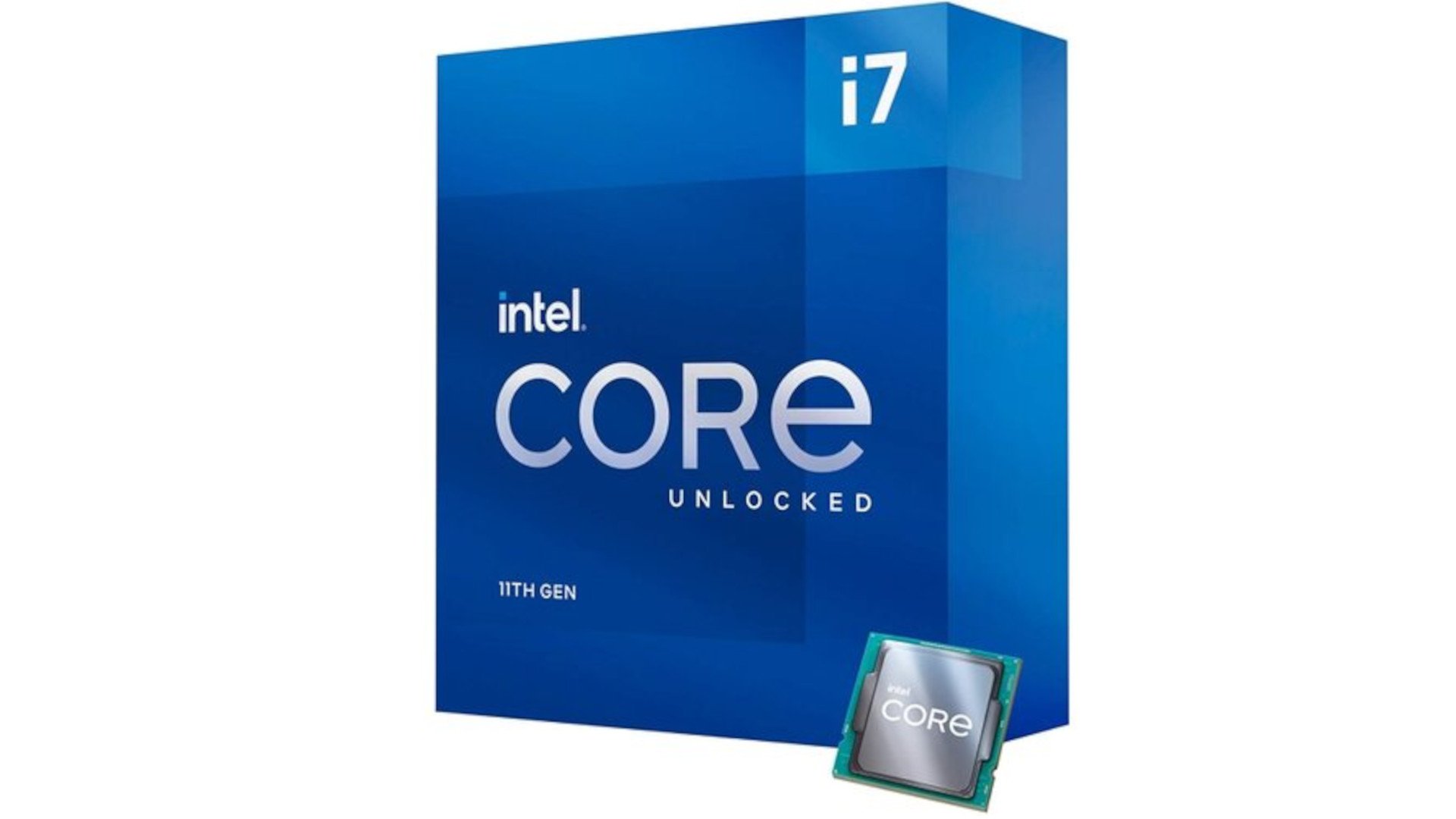
Intel reduced the 11700K’s peak boost frequency by 300 MHz compared to the Core i9-11900K, reduced memory frequencies in low-latency mode, and dropped support for the new Adaptive Boost Technology to account for the vagaries of binning and to hamstring the 11700K’s ability to create artificial segmentation (ABT).
Although the ABT technology is essentially an auto-overclocking feature that does not void your warranty, the 11700K is a fully overclockable chip. That means that the loss of that feature, as well as the additional 300 MHz of peak boost speed, may not deter CPU overclockers looking to save $140 over the 11900K.
Intel Core i7 11700K Specifications
The $539 eight-core, 16-thread Intel Core i9-11900K (a downgrade from last year’s 10-core, 20-thread Intel Core i9-10900K) matches the Core i7-11700K nearly spec for spec, save for differences in maximum boost capabilities and maximum memory clock speeds.
The maximum boost clock of the Core i7-11700K is 5.0GHz in very specific usage scenarios, whereas the Core i9-11900K is rated to peak at 5.3GHz (for a more detailed breakdown of how Intel is classifying boost speeds these days, see that review). In terms of memory speed, Intel claims that the Core i7 part is limited to DDR4-2933, while the i9 part supports up to DDR4-3200.
Overall, with only those two minor differences between chips priced $140 apart, there’s almost no scenario in which the Intel Core i7 11700K isn’t the superior choice if you’re looking for an eight-core, 11th Generation Intel processor.
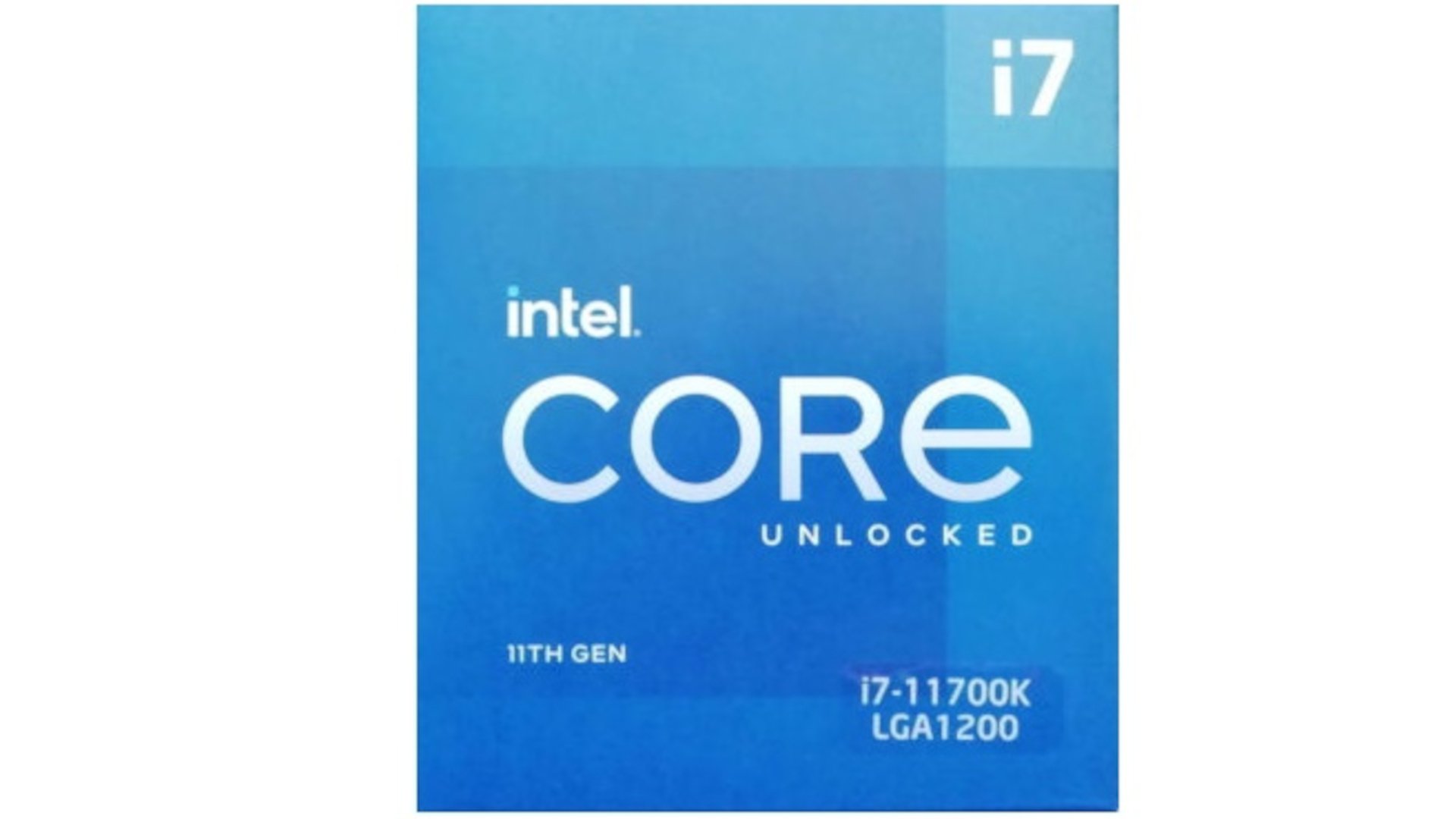
Moving on to our AMD comparison, the Intel Core i7 11700K versus the Editors’ Choice award-winning Ryzen 7 5800X is an uphill battle on all fronts. Except for price and single-core boost limits (which don’t always translate to single-core wins, as we’ll see below), the AMD processor outperforms the Core i7-11700K in almost every way, including a 105-watt TDP (versus the Core i7’s 125-watt rating), a larger 32MB versus 16MB L3 cache, and compatibility with AMD’s venerable Socket AM4 platform (although motherboard support gets spottier for 5000 Series CPUs compared to the older, cheaper 3000 Series).
Intel Core i7 11700K Essential Information
| Product Collection | 11th Generation Intel® Core™ i7 Processors |
| Code Name | Products formerly Rocket Lake |
| Vertical Segment | Desktop |
| Processor Number | i7-11700K |
| Status | Launched |
| Launch Date | Q1’21 |
| Lithography | 14 nm |
| Recommended Customer Price | $439.00 – $449.00 |
| Use Conditions | PC/Client/Tablet |
Intel Core i7 11700K Specs
| Total Cores | 8 |
| Total Threads | 16 |
| Max Turbo Frequency | 5.00 GHz |
| Intel® Turbo Boost Max Technology 3.0 Frequency | 5.00 GHz |
| Intel® Turbo Boost Technology 2.0 Frequency | 4.90 GHz |
| Processor Base Frequency | 3.60 GHz |
| Cache | 16 MB Intel® Smart Cache |
| Bus Speed | 8 GT/s |
| TDP | 125 W |
| Configurable TDP-down Base Frequency | 3.10 GHz |
| Configurable TDP-down | 95 W |
Intel Core i7 11700K Performance & Tests
In recent years, Intel’s midrange options have struggled to compete with AMD’s in productivity tasks. That’s because Intel dropped thread-doubling Hyper-Threading Technology below the Core i9 level with the 9th Generation Core line. It was restored with the 10th Generation, and it is back with the 11th Generation Rocket Lake.
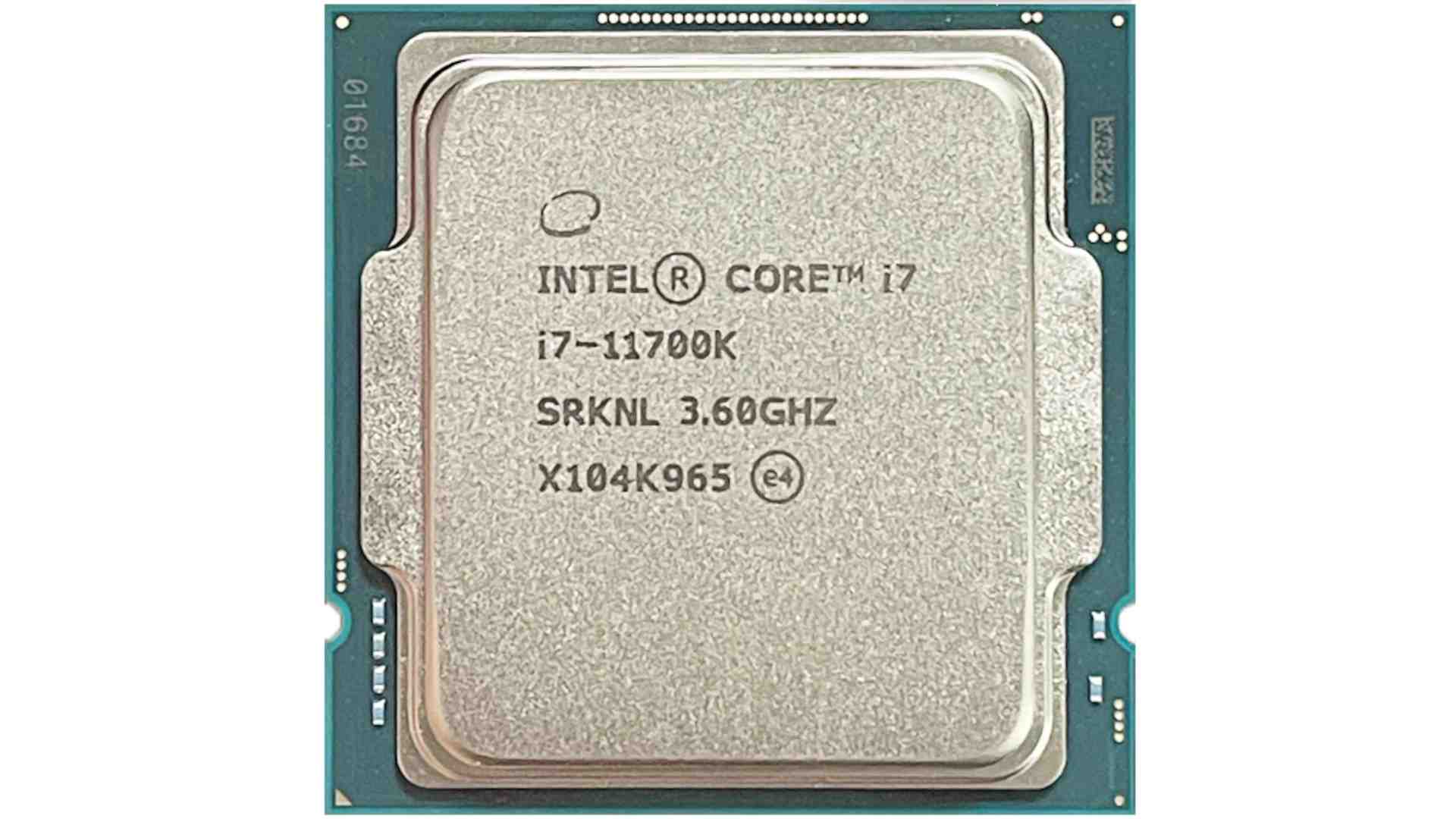
The Intel Core i7 11700K, like the rest of the 11th Gen chips, struggles against AMD’s Ryzen 5000 Series and its 7nm chiplet design as a chip that backports Intel’s 10-nanometer “Ice Lake” architecture into 14nm+++ lithography.
Except for our legacy iTunes AAC conversion test and (by one second) our Blender 3D model render, the Ryzen 7 5800X outperforms the Core i7-11700K in every single benchmark we run. Though we expected the Intel chip to lag behind the AMD, the other single-core losses are particularly galling given Intel’s usual dominance in that area.
In terms of performance versus the Core i9-11900K, the chip is a clear value winner. Sure, the Core i9 is frequently faster than the i7, but not by $140—not even close. In most cases, this is the only eight-core Intel 11th Generation chip worth considering, though this is more of a plug for the Core i7 than a condemnation of the Core i9.
Here’s what we saw in our gaming tests with our GeForce RTX 2080 Ti card in charge. This high-end consumer GPU is the primary determinant of performance at 4K with all of the CPUs listed below. However, at 1080p resolution, the card backs off a little more, allowing the CPU differences to shine through.
Intel Core i7 11700K Conclusion
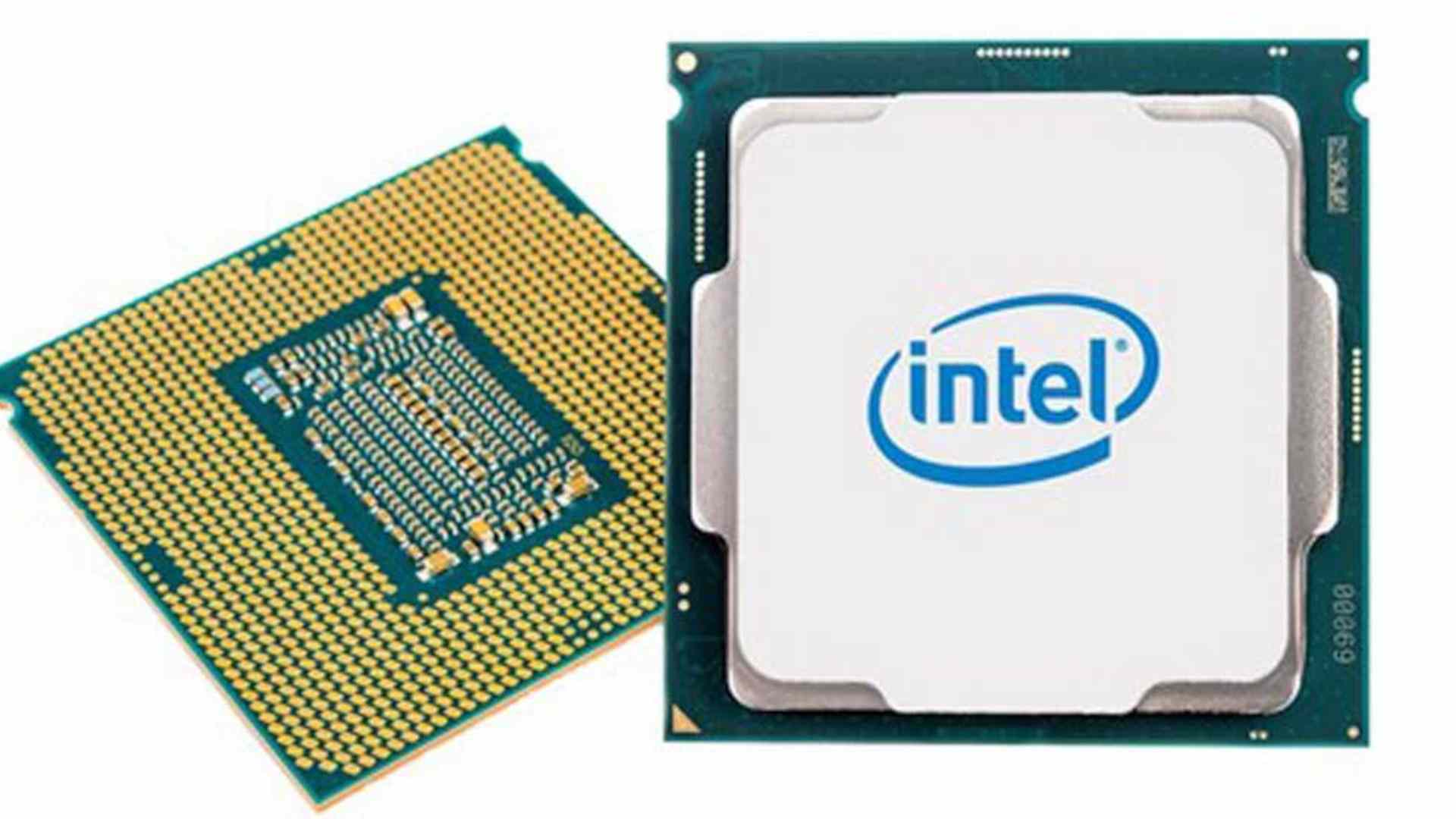
The Ryzen 7 5800X and Ryzen 5 5600X are both significantly better values for their respective use-cases. Unfortunately for the 11700K, the Ryzen 7 5800X has been widely available for a long time, and it is frequently available for less than the suggested price. The 5600X remains in short supply, but other downstream Intel chips, such as the 11600K and 11400F, are better options for gaming rigs than the Intel Core i7 11700K.
That effectively eliminates the Intel Core i7 11700K as anything more than a last-ditch option to be purchased only if the Ryzen 5 5800X is out of stock and you require the productivity performance of an eight-core chip right away.
Is the Intel Core i7 11700K worth it?
You can use the following factors to decide whether the Intel Core i7 11700K is worth it for your use case:
Performance: With 8 cores and 16 threads, the i7-11700K is a high-performance processor. It performs well on a range of tasks, such as multitasking, gaming, and content creation.
Performance for Gaming: The Intel Core i7 11700K is a good choice for gaming if that’s your main priority. It works particularly well when combined with a strong graphics card. But the GPU that is selected might also have an impact on how well a game runs.
Multithreading: The processor’s 16 threads allow for parallel and multitasking computing, which is advantageous for programs that make use of multiple cores.
Overclocking: The i7-11700K’s “K” designation means that it is an unlocked processor, meaning that overclocking is possible. It gives you the option to overclock the processor if you’re interested in going above its stock frequencies.
Cost: Take into account the i7-11700K’s price and how it fits into your spending plan. Compare its price and performance to those of other AMD and Intel processors.
Determine whether the processor satisfies your present requirements and has the potential to function well into the future. This procedure is known as future-proofing. Think about future developments and software requirements.
Although the Intel Core i7 11700K is a potent eight-core CPU with good performance for games and apps, it is not without its shortcomings. Reviews claim that the Core i7 11700K consumes a lot of power, overheats easily, and may need to be upgraded to the more expensive LGA 1200 platform. The AMD Ryzen 7 5800X, which prevails in head-to-head benchmarks, is another fierce rival.
Due to its high price, the Core i7 11700K should only be purchased as a last resort in the event that all other chips are sold out and you want an eight-core processor for productivity-related reasons. You may want to look at other options in the AMD or Intel portfolio if you’re seeking for the best value for your money.
Is Intel Core i7 11700K good for gaming?
Indeed, the Intel Core i7-11700K is a good gaming processor. Included in Intel’s 11th generation desktop CPU lineup (Comet Lake), this chip is renowned for its potent performance, particularly in demanding gaming environments. Several salient characteristics render the i7-11700K appropriate for gaming:
High Clock Speeds: The Intel Core i7 11700K can easily handle intense gaming workloads because to its high base and boost clock speeds.
Eight Physical Cores and Sixteen Threads: The processor has eight cores in total and sixteen threads when Hyper-Threading is enabled. Multitasking and playing newer games that support many cores benefit from this functionality.
Unlocked for Overclocking: The model name’s “K” prefix denotes that the i7-11700K is unlocked, making overclocking possible. Those who feel comfortable with system settings can achieve even greater performance increases by overclocking.
Integrated Graphics: The Intel Core i7 11700K comes with Intel UHD Graphics 750, which offers basic graphics capabilities, even though the majority of gaming PCs utilize a dedicated graphics card (GPU). However, using a dedicated GPU is advised for the best gaming experience.
Support for PCI Express 4.0: The processor has support for PCIe 4.0, which is advantageous for fast data transfer, particularly when using graphics cards or storage devices that are PCIe 4.0 compatible.
While the Intel Core i7 11700K is a good gaming processor, it might not be the best option for many gamers. Its powerful 5.0 GHz single-core turbo boost frequency makes it ideal for the majority of single-threaded games. It does, however, have certain disadvantages, including high temperatures, high power consumption, and an expensive platform upgrade to LGA 1200.
The AMD Ryzen 7 5800X, which offers superior multi-core performance and reduced power consumption3, is another fierce rival. A less expensive option that provides gaming performance comparable to the Intel Core i7 11700K is the Ryzen 5 5600X.
Can you overclock the Intel Core i7 11700K?
The Intel Core i7 11700K can be overclocked, but you’ll need an appropriate cooling system, a suitable motherboard, and some overclocking software. The process of overclocking involves raising your processor’s clock speed over its default settings, which can enhance performance in specific apps and games. Overclocking, however, also raises your system’s heat production, power consumption, and potential instability, so proceed at your own risk and with prudence.
The basic clock speed of the Intel Core i7 11700K is 3.6 GHz, while the highest turbo boost frequency for all cores is 5.0 GHz. Depending on their motherboard and cooling arrangement, some users have reported reaching stable overclocks of up to 5.3 GHz or 5.2 GHz for all cores.
However, the hardware, software, and environmental elements that affect you may have an impact on your findings. When overclocking, you should constantly keep an eye on your system’s power, temperature, and performance and refrain from overclocking your processor above its safe limitations. You should overclock at your own risk and liability since it may void your warranty and damage your hardware.
What temperature should an Intel Core i7 11700K run at?
General temperature recommendations for the Intel Core i7 11700K are as follows:
Idle Temperatures: The system should have relatively low idle temperatures, sometimes just a few degrees above room temperature, when it is not operating at a high load.
Normal Operating Temperatures: As long as workloads are reasonable, temperatures should typically range from the mid- to high-60s to the low-70s degrees Celsius.
Peak Temperatures: Although temperatures may rise under demanding workloads or stress tests, it’s usually best to maintain them below the Tjunction temperature. In order to prevent overheating, the majority of CPUs are built to automatically lower their clock rates or take other action.
A high-performance processor that can operate at high temperatures under intense load is the Intel Core i7 11700K. The Core i7 11700K has a maximum working temperature of 100°C, which means that in order to prevent damage, the CPU will begin to throttle or limit its performance if it reaches this temperature. It is not advised to operate your processor at this temperature though, as it may shorten its lifespan and stability. For the Intel Core i7 11700K, a more ideal temperature range is between 40°C and 80°C.
How much power does the Intel Core i7 11700K draw?
Under extreme load, the high-performance Intel Core i7 11700K processor can consume a significant amount of electricity. The Core i7 11700K has a TDP of 125 watts, which indicates that at its maximum base clock of 3.60 GHz, the CPU would draw a maximum of 125 watts of electricity. For brief intervals, the processor may also turbo to rates as high as 5.00 GHz. Since this calls for additional power, the Core i7 11700K’s PL2 (power limit 2) is set to roughly 250 watts.
Intel Core i7 11700K
-
Performance - 97%97%
-
Price - 98%98%
-
Value - 98%98%

